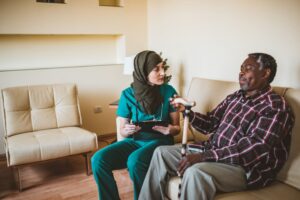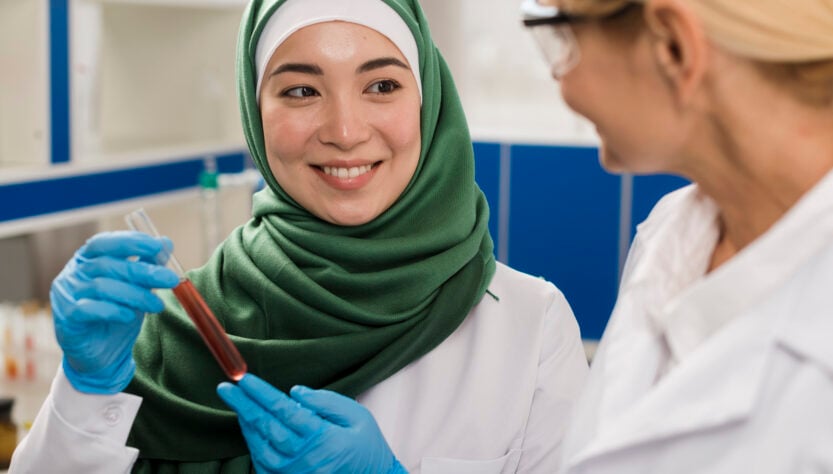Name: Asmaa Yaseen Mawlood
Research Assistant
Faculty of Nursing – TIU – Erbil
Many have heard of the Lady with the Lamp, Florence Nightingale the Founder of Modern-day Nursing. She became prominent during the Crimean war in the 1850s, where she tended to injured soldiers, trained nurses and encouraged social reform. Her contribution to humanity is undoubtedly remarkable. Many centuries before Florence Nightingale, a virtuous woman from amongst the Ansar (Helpers) of Madinah appeared and emerged as an Expert Practising Nurse.
Rufaida Al-Aslamiya was the first professional Muslim female nurse in history. She was an amazing woman from the Ansar (Helpers) of Madinah and an exemplary female companion of the Prophet Muhammad ﷺ. Rufaida Al-Aslamiyah was born in the Bani Aslam tribe in Madinah. It is for this reason that she was called Al-Aslamiyyah. Her family had strong ties with the medical community. Her father, Sa’ad Al-Aslamiy, was a physician with whom she gained much of her knowledge growing up.
She was amongst the first people in Madinah to accept Islam. She was honoured to witness the arrival of Prophet Muhammad ﷺ into Madinah during the Hijrah (migration from Makkah to Madinah). She practised as a nurse at the time of the Prophet ﷺ and held the prestigious title of being the first Muslim nurse in history.
She is estimated to have been born 620 — 1,200 years before Florence Nightingale. The Prophet ﷺ gave Rufaida permission to erect a tent inside the Prophet’s mosque (Al-Masjid Al-Nabawi) in Madinah to provide nursing care and to train Muslim women as nurses. As such, she became a pioneer in her field, devoting her life to the development and improvement of nursing. Some reports also suggest she was the first female surgeon in Islam.
When Sa’ad ibn Muadh was injured in the Battle of Al-Khandaq (The Trench), the Prophet ﷺ ordered to place and treat him inside her tent. When the Muslim army was getting ready to go to the Battle of Khaibar, Rufaida and a group of fellow Ansar women went to the Prophet ﷺ. They asked him for permission to go with the army to the battle, to help and treat the injured. The Prophet ﷺ permitted them to go.
Rufaida accompanied Prophet Muhammad (PBUH) during his wars, participating in many battles, such as Badr, Uhud, Khandaq, Khaibar, and others. She was responsible for caring for the wounded and dying soldiers and established a field hospital with a system of movable tents to assist the wounded and diseased warriors. She highly focused on hygiene and the environment and led a group of female volunteer nurses during wars.
During the war, she used to guide groups of helper nurses who went to the battlefield and treated the wounded. Rufaydah had trained a group of women companions as nurses. They could keep several tasks during the war; provided water for the sick and wounded, cared for the wounded and offered medicine, took care of the dead and transported them to the Madinah for post-mortem care. She was a capable leader and an organizer, able to mobilize and get others to produce good work. She had clinical skills that she shared with the other nurses she trained and worked with. She did not confine her nursing to the clinical situation.
She went out to the community and tried to solve the social problems that led to disease. She was both a public health nurse and a social worker.
As an appreciation for her efforts, the Prophet assigned a share of the booty to Rufaydah, equivalent to the soldiers who had fought. Her role did not stop after the wars. She continued practising nursing and health care in her tent in the peaceful times by taking care of diseased and disabled people. She advocated for Health care, Education, and Disease Prevention.
Rufaida designed codes of ethics for nursing and medical care. She established new rules and traditions for nursing that can be considered precious to modern nursing techniques. Rufaida was a pioneer in nursing in her era. Her achievements encouraged other women to follow her footsteps. Since she received her clinical expertise from her father, who was a physician, Rufaida decided to pass her knowledge to young women to follow her path. Thus, she established a school where she taught Muslim women Nursing, first aid, and emergency care; this school was the first nursing school in the Middle East.
Today, the Royal College of Surgeons in Ireland at the University of Bahrain awards one student annually the coveted and prestigious Rufayda Al- Aslamia Prize in Nursing for the student who consistently excels in delivering super nursing care to patients. Stories about her work were passed on through the generations orally but over time, they became forgotten. In recent decades, however, she has been rediscovered as the founder of nursing in the Muslim world, and several scholarly articles have been written about her. In one of the first, Suad Hussain concluded that “Rufaida devoted her life to the development and improvement of nursing. She succeeded in laying new rules and traditions as the basis of better nursing.” In Pakistan, a building at The Aga Khan University School of Nursing was named after her.



